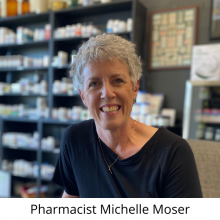What is Low Dose Naltrexone (LDN) made from?
This is a really great question. I haven't I haven't actually seen some of this before. So what is LDN? Is it vegetarian? For some sensitive body types wishing to try, wishing to try it is it....I'm trying to find a doctor with the type of caution and experience you have described. Well, it's not animal-derived and it's not vegetable-derived. Technically it's synthetic. It was originally developed back in the early 60s. I think it was FDA approved in '64. If I remember right, naltrexone was developed to prove how morphine worked. They needed to be able to,
and this again is all through the FDA, but they had this molecule morphine right we knew it worked really well for pain but we needed to be able to summarize exactly its mechanism of action, and so a lot of times, what chemical the pharmaceutical industry would do is find the opposite or find something that a molecule that was opposite that you could then turn it off. And that's what they realized with naltrexone is that it's like an anti-morphine. It actually turns it off. So with that, it is synthetic. For the sensitive body types, I believe anybody with an autoimmune issue or chemical sensitivity most of us are incredibly sensitive to many things at this point just because of the environment that we live in. And that's why we start so low and slowly increase the dose so that we can find that person's happy dose. I was talking with someone just a little bit ago before we started this session and she can't get above one milligram. She gets a headache. So it's like, well then, don't go above one milligram. Your.. but her other symptoms that she's trying to control, her inflammation and pain, that's fine, that's working out very well. And again it's an educational process not just with the patient but again with the prescriber as well because a lot of times the prescribers think one and a half, three four and a half, but we're done or they just jump right in at three or right in at 4.5 milligram and think well I just don't have time to mess around with this and helping patients kind of hold their hand through the process. Well, that's where the pharmacists really come in, and that's where tapping our expertise allows us to help you through that process. Most of us, especially those of us who have gone through the LDN master classes to become certified, I mean we don't do this because of the paycheck that comes at the end of the day, this is what we do to educate people regularly, and these questions are not only really helpful for you right now, but this is actually going to be addressed with a question that maybe somebody hasn't actually verbalized yet. So I really thank you for this question. It's really helpful and I just the whole educational process that's why Linda set up the trust to begin with. If you need to find a prescriber again you can go out to the LDN research trust. There's a long list of individuals there and also a little bit about what they do so that you can call them and maybe visit them, try them on for size right because not every personality meshes, so you've got to find the right fit. Sometimes you can even work through your compounding pharmacy. So if you're in the UK, get a hold of Stephen. If you're in the US get a hold of either Sam or me and a lot of times, your compounding pharmacists are opening the door to the type of prescriber that you're looking for because not all prescribers are really well-versed in every issue every health care issue. So sometimes, that's where you could find a really good fit for you a little bit quicker.








